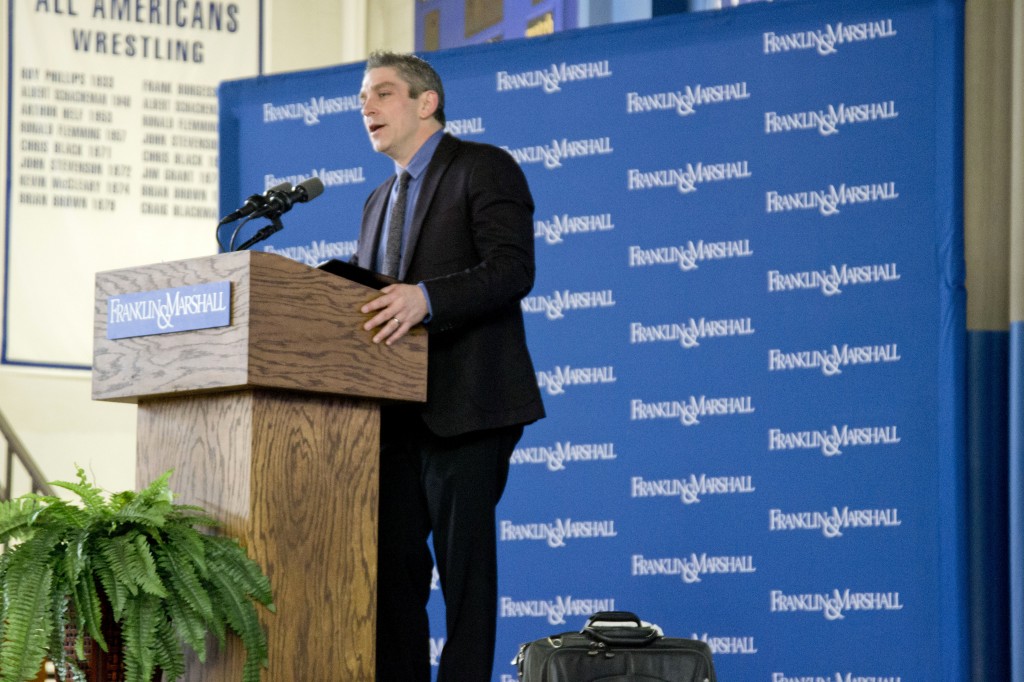By Eric Acre, Staff Writer ||

this week’s Common Hour and provided students with his insight. Photo by Krissy Montville ’14
Attendants of this week’s Common Hour were graced by the poetry of Richard Blanco, the fifth inaugural poet of the United States.
Dan Porterfield, president of the College, took to the stage to introduce Blanco, whose accomplishments he lauded.
“[Blanco is the fifth inaugural] poet in the nation’s history, the youngest, first Latino, immigrant, openly gay man to read his work at a presidential inauguration.”
Blanco’s family moved from Cuba to Madrid while his mother was pregnant, but he grew up in Miami, Fla. He earned his B.S. in civil engineering from the University of Florida in 1991 and his master’s degree in creative writing in 1997. He has received numerous awards for his work, ranging from the Agnes Lynch Starrett Poetry Prize in 1997 to an honorary Doctorate in Humane Letters from Macalester College in 2013, with many in between.
Blanco is known for his ability to capture the complexities of the human condition, His poetry is often described as relatable, and he strives to reinstate poetry as a part of the everyday lives of people everywhere. This is evident in his poem “Boston Strong,” which was written to help the relief efforts after the Boston Marathon bombings in April 2013.
Blanco’s presentation, entitled “For all of Us, One Today,” served as the narrative for what he called “the emotional road to the podium at Washington, D.C.” It consisted of several of the poems he wrote over the course of his life, all of which he hoped the audience could relate to in some way, shape, or form.
“Common human denominators [which are questions everyone asks themselves, include] where am I from? and where do I belong?” Blanco said.
Blanco’s first poem, “Betting on America,” is his childhood account of his family watching the Miss America pageant. He recounts the lives of each of his family members in that moment, such as his grandmother, the bookie, who was taking bets for who would win the pageant. His father refused to bet on any contestant “because they all have skinny butts.” When Ms. Ohio ended up winning the pageant, the contestant that nobody bet on, Blanco’s mother asked, “Chico, where is Ohio?”
This poem is both raw and eloquent at the same time, with the family members’ quotations striking a familiar chord with anyone who has shared a similar family moment.
Blanco’s second poem, “Mother Country,” details his mother’s experience moving to America from Cuba and her struggle in throwing away everything that she had ever known for a new life. The minute details, like how his mother would always get ashamed when her Thanksgiving turkey came out dry or how she kept a jar of dirt from Cuba and goodbye letters that she would not open for years seem to make this poem relatable to immigrants.
Blanco’s third poem, entitled “Papa’s Bridge,” tells the story of Blanco crossing the highest bridge in Miami with his father, and his memories of that experience as he crossed the bridge every day on his way to work. He then recounted the view of the bridge from his father’s deathbed and the moments they shared.
“Mijo, you’ll know how to build bridges like that someday,” said Blanco’s father, which reflected Blanco’s original ambitions to become an engineer.
The imagery of vague nostalgia and fond memories gives the bridge a deep symbolic meaning for Blanco, and many individuals have formed connections like these in their lives.
All of Blanco’s poems have some aspect of them that is relatable to listeners, regardless of their subject matter. Blanco aims to reinforce the fact that modern poetry is a valuable asset to American life. Blanco ended his talk by expressing his wish that young people will make room for poetry in their lives and appreciate its universal appeal.
First-year Eric Acre is a staff writer. His email is eacre@fandm.edu.